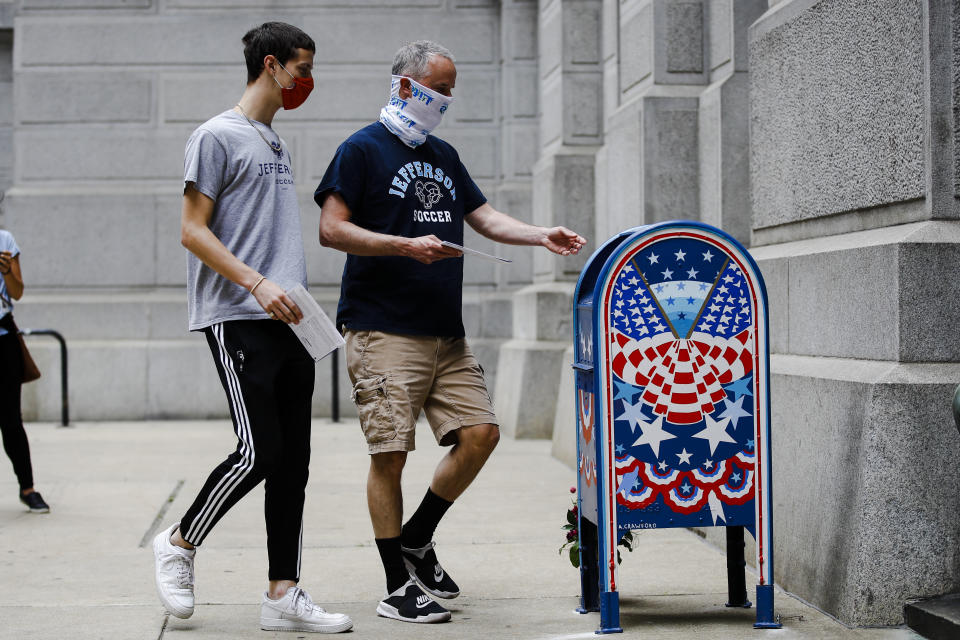Democrats Win Major Pennsylvania Case Extending Mailed Ballot Receipt Deadline
The Pennsylvania Supreme Court extended the receipt deadline for mailed absentee ballots in that state to three days after Election Day in a ruling issued Thursday. Mailed ballots that are postmarked by 8 p.m. on Nov. 3 will count so long as they arrive by 5 p.m. on Nov. 6.
The decision is a victory for the state’s Democratic Party, which brought a challenge to state election laws that it said place burdens on voters trying to cast ballots safely during the coronavirus pandemic. It is a loss for President Donald Trump, who has claimed that he will lose the election only if there is fraud, which he falsely says will be rampant thanks to mail-in voting. Trump and Republicans in the state legislature intervened to oppose the extension of the ballot receipt deadline.
It is also a major ruling in the context of the 2020 presidential election, as Pennsylvania is viewed as one of the key swing states in the Electoral College. The extension of its ballot receipt deadline is among the most pivotal changes sought as part of a record-breaking number of election-related legal challenges across the country.
The decision likely means that tens of thousands of votes that would have otherwise been judged void will now be counted. When courts extended the ballot receipt deadline in Wisconsin ahead of its April 7 primary election, tens of thousands of ballots were counted that otherwise would have been discarded for arriving too late. Trump won Pennsylvania by just 44,000 votes in 2016.
Previously, ballots cast by mail in Pennsylvania had to arrive by 8 p.m. on Election Day to be counted. Any ballots arriving after that time became invalid.
Democrats argued that this cutoff was unreasonable due to the pandemic and the mail delivery slowdowns caused by both the virus and the efficiency reforms instituted by Postmaster General Louis DeJoy.
A majority of the state Supreme Court agreed that the pandemic “equates to a natural disaster” and that voters should not be impeded from casting ballots based on the obstacles that nature imposes. The court stated that the anticipated flood of mailed ballots and the U.S. Postal Service’s admission in an August letter to 46 states that it may not be able to deliver those ballots on time justified extending the ballot receipt deadline.
“[W]e conclude that the timeline built into the Election Code cannot be met by the USPS’s current delivery standards,” the majority opinion says.

The court’s ruling also allows the state to count ballots that arrive up to three days after Election Day even if they do not have a postmark or have an illegible postmark. These ballots will be treated as though they were postmarked on time unless there is evidence to show otherwise.
“We refuse ... to disenfranchise voters for the lack or illegibility of a postmark resulting from the USPS processing system, which is undeniably outside the control of the individual voter,” the opinion states.
The case arrived at the Pennsylvania Supreme Court after Kathy Boockvar, secretary of the commonwealth and officially a target of the original complaint, filed an “extraordinary” petition asking the court to review the matter at hand. Boockvar wanted the court to sort out the diametrically opposed interpretations of state election law in filings from the Democrats and Trump in a timely manner so that the law would be clear for voters before Nov. 3.
Boockvar further stated her support for a version of the relief sought by the Democratic Party. Where the original challenge wanted to extend the ballot receipt deadline to 10 days after the election, she told the court that an extension to three days after would be sufficient. The court adopted Boockvar’s recommendation.
“[T]his extension of the received-by deadline protects voters’ rights while being least at variance with Pennsylvania’s permanent election calendar, which we respect and do not alter lightly, even temporarily,” the opinion states.
Aside from the ballot receipt deadline, Democrats and Trump had asked the court to review other aspects of Pennsylvania’s election law.
The court ruled in favor of Democrats’ requests to allow county election officials to deploy drop boxes where voters can deposit their ballots in places other than election offices and to maintain the current law that mandates volunteer poll watchers working for political parties observe voting only at sites within the counties where they reside.
Democrats did lose on two other key issues. The court ruled against their request that voters be provided the opportunity to fix, or “cure,” any minor errors on their mailed ballots, like a mismatched signature, and that ballots not sent in the required secrecy envelope still be counted as valid.
We want to know what you’re hearing on the ground from the candidates. If you get any interesting ― or suspicious! ― campaign mailers, robocalls or hear anything else you think we should know about, email us at scoops@huffpost.com.
Love HuffPost? Become a founding member of HuffPost Plus today.
This article originally appeared on HuffPost and has been updated.

 Yahoo News
Yahoo News 

